|
|
|
Sort Order |
|
|
|
Items / Page
|
|
|
|
|
|
|
| Srl | Item |
| 1 |
ID:
112073
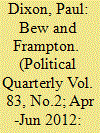

|
|
|
| 2 |
ID:
112080
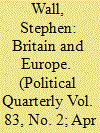

|
|
|
|
|
| Publication |
2012.
|
| Summary/Abstract |
Britain decided to join the European Community because its postwar, postimperial policies had failed and successive Governments saw no viable alternative. After ten years of being denied entry by De Gaulle, Britain joined on disadvantageous terms and with the British political parties, and the British people, deeply divided. Accession did not resolve the underlying issues and Britain's first year of membership saw an unprecedented oil crisis, bad relations between Britain and the United States and the demise of the British government led by Edward Heath. The underlying issues which had not been resolved in the accession negotiations were reopened by Harold Wilson and later by Margaret Thatcher. Some of them remain unresolved in British politics to this day.
|
|
|
|
|
|
|
|
|
|
|
|
|
|
|
|
| 3 |
ID:
112090
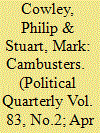

|
|
|
|
|
| Publication |
2012.
|
| Summary/Abstract |
The backbench rebellion that hit the Coalition government in October 2011 was one of the largest Commons revolts of the postwar era, on any issue. But it was not just its size that was noteworthy. This article outlines ten points about the origins of the vote, its timing, its composition, and the nature of the divisions it revealed. Facilitated by recent procedural innovations in the Commons, the rebellion was both evidence of a longer-term rise in dissent amongst MPs of all parties, as well as other medium-and short-term factors within the Conservative party. It leaves the Prime Minister caught in an impossible triangle, attempting to satisfy his pro-European Liberal Democrat partners in the Coalition, while keeping his Euro-sceptic rebels happy, and yet retaining enough credibility in European capitals to negotiate successfully.
|
|
|
|
|
|
|
|
|
|
|
|
|
|
|
|
| 4 |
ID:
112072


|
|
|
|
|
| Publication |
2012.
|
| Summary/Abstract |
This article responds to the critique of our work offered by Paul Dixon in this issue of Political Quarterly. We correct the numerous inaccuracies and straightforward errors in his work, which, in our view, distort and misrepresent our arguments.
|
|
|
|
|
|
|
|
|
|
|
|
|
|
|
|
| 5 |
ID:
112067
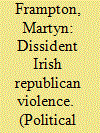

|
|
|
|
|
| Publication |
2012.
|
| Summary/Abstract |
This article considers the resurgence in dissident Irish republican violent activity in the years since 2007. It examines the reasons why this has occurred, citing the significance of 'intra' republican political developments, alongside important 'secondary' factors, such as the death of influential republicans Brendan Hughes and Brian Keenan. It concludes by noting that the dissident threat seems likely to exist for the foreseeable future, but also emphasises the limits of what they can expect to achieve, with there being little prospect of their emulating the Provisional IRA.
|
|
|
|
|
|
|
|
|
|
|
|
|
|
|
|
| 6 |
ID:
112084
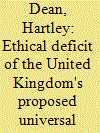

|
|
|
|
|
| Publication |
2012.
|
| Summary/Abstract |
Universal Credit is a proposed means-tested cash benefit scheme in the UK that will serve, inter alia, to top-up the wages of low-paid workers. This article will argue first, that the moral justification for the scheme that is offered by the UK government is specious; second that the reconfiguration of existing wage top-ups may be counterproductive and will in any event do little, if anything, to promote the work ethic; third, that the new scheme will not relieve but add to the injustices borne by the 'precariat' (the workers engaged in low-paid precarious employment); finally, that far from having a justifiable moral purpose, Universal Credit is ethically flawed.
|
|
|
|
|
|
|
|
|
|
|
|
|
|
|
|
| 7 |
ID:
112088
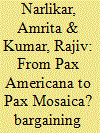

|
|
|
|
|
| Publication |
2012.
|
| Summary/Abstract |
While the economic rise of new powers, frequently identified as the 'BRICs' (Brazil, Russia, India, and China), has been dramatic, the implications of this emerging multipolarity for global economic governance are not clear. In this paper, we address the question: can the diffusion of power among a greater diversity of countries result in the creation of a new global economic order-a Pax Mosaica-to succeed the Pax Americana of the previous century? Our argument proceeds in four steps. First, we provide a brief overview of the achievements and limitations of the system that was established at the end of World War II, and lasted for over half a century in the form of Pax Americana. In the second section, we investigate the emergence of multipolarity, and highlight the opportunities and costs that this generates. In the third section, we explore the routes whereby the changing balance of power might be harnessed towards the creation of a Pax Mosaica. We do so by posing four sets of questions, which must be answered if the mosaic distribution of power is to lead to greater economic stability, growth, and peace. The fourth section concludes the paper with ideas for reform with reference to the World Trade Organization, the Bretton Woods institutions, and the G20.
|
|
|
|
|
|
|
|
|
|
|
|
|
|
|
|
| 8 |
ID:
112079


|
|
|
|
|
| Publication |
2012.
|
| Summary/Abstract |
Despite attempts over the last decade to bring an end to what has become an 'arms race' between political parties, party funding in the UK continues to defy resolution. Drawing on the experience of the committee charged by the last Labour administration to put party funding and electoral spending on a more sustainable footing, this article examines the issues and the main sticking points. It outlines the basis on which the negotiations were undertaken, and the main hurdles they sought to overcome. It highlights the disagreement between the parties on the definition of the central issue, the problems associated with the main funding sources for each of the parties, and the viability of state funding. It discusses why success proved elusive, but also why a solution is necessary, since in the absence of robust rules, parties and therefore the UK political system more broadly, are 'a hostage to the next scandal'.
|
|
|
|
|
|
|
|
|
|
|
|
|
|
|
|
| 9 |
ID:
112078
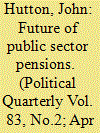

|
|
|
|
|
| Publication |
2012.
|
| Summary/Abstract |
The dramatic rise in life expectancy and longer retirement has created serious concerns about the long-term affordability of public sector pensions. Drawing on insights from a recent inquiry into public sector pension reform, commissioned by the Conservative-Liberal Democrat Coalition and led by the author, this article outlines the challenge faced by policy makers and sets out how it should be addressed. It argues that, with 12 million people active in this part of the pensions system, and estimates that the gap between contributions and payments will grow from £3bn to £10bn in the next decade, the government has no choice but to enter the 'lions' den' of pensions' policy. It contends that any long-term solution is to be crafted cannot be based solely on economics, but must also answer fundamental questions of ethics and equity.
|
|
|
|
|
|
|
|
|
|
|
|
|
|
|
|
| 10 |
ID:
112071
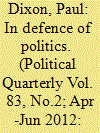

|
|
|
|
|
| Publication |
2012.
|
| Summary/Abstract |
The interpretation of the Northern Ireland peace process is highly controversial because it not only has implications for the future of Northern Ireland but 'lessons' are also drawn for dealing with terrorism and insurgency globally. This article reviews and critiques key interpretations of the peace process. 'The Militarists', Republican Dissidents and Neoconservatives, offer a 'fundamentalist idealist' interpretation which leads them to reject political compromise and continue to pursue victory by military means. 'The Enthusiasts' are leading figures in the Labour government who champion the outcome of the peace process and recommend 'talking to terrorists'. 'The Sceptics' argue in defence of politics and support the pragmatic realism used to negotiate accommodation. They are critical of 'The Militarists' for misinterpreting the peace process and threatening to go back to 'war'. 'Sceptics' welcome powersharing but criticise the 'Enthusiasts' for mishandling the peace process and undermining the moderate parties. This has left Northern Ireland with high levels of segregation and economic inequality that prevent the consolidation of peace.
|
|
|
|
|
|
|
|
|
|
|
|
|
|
|
|
| 11 |
ID:
112076


|
|
|
|
|
| Publication |
2012.
|
| Summary/Abstract |
Although governments intervene extensively across an ever-increasing range of activities, there are some problems that they are loath to address. These issues vary in size, scale and complexity. Some are local; others are national. A number are international or global. The impediments to action also differ. They may be technical, institutional or political. In some cases, there is no agreement even that a problem exists. In a few, by contrast, expert consensus on diagnosis and prescription may have been long-standing, even if yet to issue in concrete measures. What these issues share, however, is that their successful resolution would bring significant benefits to society, but that for whatever reason governments consider them too problematic to tackle. Hence they are consigned to the 'too difficult box'. Where this happens the system of democracy is itself likely to be weakened. This article discusses these issues and introduces contemporary instances.
|
|
|
|
|
|
|
|
|
|
|
|
|
|
|
|
| 12 |
ID:
112074


|
|
|
|
|
| Publication |
2012.
|
| Summary/Abstract |
During the troubles, the role of a Northern Ireland correspondent evolved from ambulance chaser to peace process 'Kremlinologist', keeping an eye on the subtle shifts within the political negotiations. Now the interest of the international media has waned and reporters have to generate fresh stories relevant to the local audience, against the backdrop of an adverse economic climate. Some stories may be Northern Ireland specific, dealing with the legacy of the troubles. Others involve economic and social issues common to other areas of the UK or Ireland. Knowledge of the conflict remains a prerequisite for covering Stormont politics, dissident republican attacks, or loyalist violence. However journalists should be mindful of the concerns of a younger generation who increasingly regard the paramilitary ceasefires and peace deals as history.
|
|
|
|
|
|
|
|
|
|
|
|
|
|
|
|
| 13 |
ID:
112075


|
|
|
|
|
| Publication |
2012.
|
| Summary/Abstract |
In December 2007, Northern Ireland's newly elected First and Deputy First Ministers, Ian Paisley and Martin McGuinness, were pictured sitting happily together on a read leather sofa at the new IKEA superstore in Belfast. It was an image that served as a powerful symbol of the region's political transformation and economic optimism. Yet, within months of this photo opportunity, global financial crisis and economic recession shattered hopes that a meaningful, economic 'peace dividend' would underpin the new political dispensation. This article takes a critical look at the media's role in conflict transformation in Northern Ireland; how they projected new and more positive images of life in the region and chronicled the daily business of 'bread and butter politics'. However, it also identifies chronic decline among some sections of the regional media, particularly Belfast's daily newspapers, just when they are needed to monitor and debate political decision-making in a time of austerity.
|
|
|
|
|
|
|
|
|
|
|
|
|
|
|
|
| 14 |
ID:
112082


|
|
|
|
|
| Publication |
2012.
|
| Summary/Abstract |
Although the political salience of nuclear disarmament has fallen dramatically since the end of the Cold War, the threat posed by nuclear weapons today remains at least as great as it was before 1989. The growing number of states either armed with or actively developing nuclear weapons programmes has placed existing control and monitoring frameworks under strain. In this article, Baroness Williams, a long time campaigner for multilateral nuclear disarmament, discusses the nature of today's nuclear threat and particularly the political challenge presented by states whose behaviour is not predictable. If further proliferation is to be prevented, the international community must renew its efforts at implementing a robust regime of control. The IAEA must be given the authority and the resources necessary to conduct inspections anywhere in the world without prior warning. At the same time, the world's nuclear states powers must begin genuine efforts at disarmament.
|
|
|
|
|
|
|
|
|
|
|
|
|
|
|
|
| 15 |
ID:
112065


|
|
|
|
|
| Publication |
2012.
|
| Summary/Abstract |
This article discusses recent developments in dissident Irish republicanism and some of the arguments advanced to explain its emergence as a factor in Northern Irish politics. In particular it considers those explanations which define these new armed groups as either the latest manifestation of a historically determined Irish republican tradition or simply as 'residual terrorist groups' left behind by Provisional republicanism's movement into the constitutional mainstream in the 1990s. It rejects these arguments as ahistorical and schematic, and instead suggests that the dynamics and trajectory of dissident republicanism are shaped instead by the inherent tensions and structures of 'the new Northern Ireland'. It goes on to compare the contemporary political, social and economic forces that produce the dissidents with the conditions that created the Provisionals as in the early 1970s and concludes that whilst these new groups will continue to pose a threat to the 'normalization' of the new dispensation they will not be successful as their republican forebears in mobilizing a significant and sustained challenge to the Northern Irish state.
|
|
|
|
|
|
|
|
|
|
|
|
|
|
|
|
| 16 |
ID:
112066
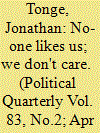

|
|
|
|
|
| Publication |
2012.
|
| Summary/Abstract |
The episodic dissident republican activity evident in Northern Ireland since the Good Friday Agreement has been accompanied by regular assertions from the police, politicians and commentators that dissidents have no backing. This article examines the historic importance of mandates and support for previous and contemporary republican armed campaigns. It explores whether violent republicans have ever enjoyed widespread support in Ireland and assesses the extent to which a lack of backing has precluded violent campaigns. The piece analyses the evidence regarding the lack of sympathy for current dissident violence, assessing the degree to which armed republicanism has reached a new level of isolation.
|
|
|
|
|
|
|
|
|
|
|
|
|
|
|
|
| 17 |
ID:
112064
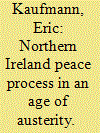

|
|
|
|
|
| Publication |
2012.
|
| Summary/Abstract |
The steady drip of dissident Republican attacks forms the backdrop to this special issue of Political Quarterly. Moreover, this comes at a time of economic austerity, when Northern Ireland faces unprecedented cuts to its public sector-dominated economy. The economic crisis in the South adds an additional layer of uncertainty to the picture. In the past, economic deprivation has been associated with conflict in Northern Ireland and elsewhere. Might the peace dividend and constitutional settlement which have underpinned the Northern Ireland 'miracle' since 1994 be under threat? Or is there now sufficient momentum in both of Northern Ireland's main ethnic communities that such an outcome can be safely averted? This paper summarises the thinking of our symposium and special issue on this topic, updating our picture of the Northern Ireland peace process.
|
|
|
|
|
|
|
|
|
|
|
|
|
|
|
|
| 18 |
ID:
112089


|
|
|
|
|
| Publication |
2012.
|
| Summary/Abstract |
The World Trade Organization's (WTO) Doha round is in trouble; but so is the way we talk about the institution and the negotiations. Economists, international lawyers, political scientists, practitioners and pundits alike have locked themselves into a deeply constraining and quite unhelpful way of talking and thinking about the WTO that has little to offer either the round or the Organization. Indeed, the way commentators have chosen to talk about the problems of the round, as well as the options for moving forward, may actually be compounding matters, reinforcing the likelihood that Doha will produce little, that future negotiations will continue to be dramatic and hard to conclude, and that inequitable outcomes will persist. My aim here is to shine a light on the bounded nature of the current debate with a view to agitating for a less constrained and more fruitful conversation about Doha, the WTO and beyond.
|
|
|
|
|
|
|
|
|
|
|
|
|
|
|
|
| 19 |
ID:
112068
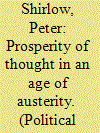

|
|
|
|
|
| Publication |
2012.
|
| Summary/Abstract |
A central failing of analysis of the peace process has been to account for, explain and determine the extent of loyalist-led conflict transformation. My argument is that, despite evident wrong-doing, there has been a failure to appreciate the prosperity of loyalist thinking and action in the period after the paramilitary ceasefires of 1994. Loyalism has appeared less relevant than it is to peacemaking due to its criminalisation, its refusal to accept positive morphology and a failure to self-promote. An appreciation of the positive nature of loyalist transition offers much to those who seek to comprehend the future of Northern Ireland.
|
|
|
|
|
|
|
|
|
|
|
|
|
|
|
|
| 20 |
ID:
112083
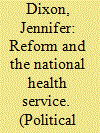

|
|
|
|
|
| Publication |
2012.
|
| Summary/Abstract |
Why is there so much discontent about the current plans to reform the National Health Service in England? What is the government trying to do, and are the critics right to want to block reform? This paper traces the genesis of the current proposals in the Health and Social Care Bill, currently in the Lords, and why the Government has had to water down significant parts of it to appease the critics. The paper argues that the case for change has not been made to public or the 1.3 million staff in the NHS, the extent and timing of the reform is far from ideal given the need to make unprecedented efficiencies in the NHS, and that the political process to gain support has been weak. Yet many elements of the Bill push the NHS in the right direction, and without effective reform the original settlement-to provide equal access to care on the basis of need-is put at risk.
|
|
|
|
|
|
|
|
|
|
|
|
|
|
|
|
|
|
|
|
|